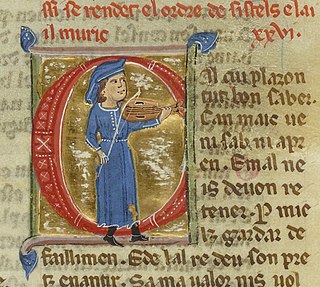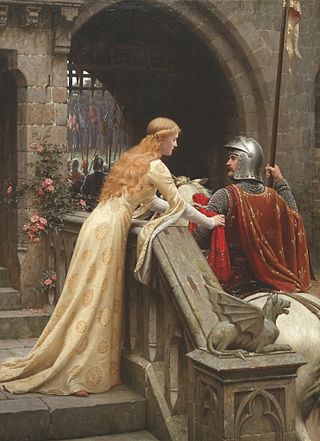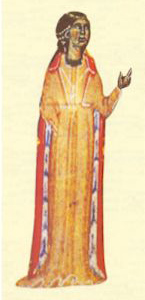
A troubadour was a composer and performer of Old Occitan lyric poetry during the High Middle Ages (1100–1350). Since the word troubadour is etymologically masculine, a female equivalent is usually called a trobairitz.

Courtly love was a medieval European literary conception of love that emphasized nobility and chivalry. Medieval literature is filled with examples of knights setting out on adventures and performing various deeds or services for ladies because of their "courtly love". This kind of love was originally a literary fiction created for the entertainment of the nobility, but as time passed, these ideas about love spread to popular culture and attracted a larger literate audience. In the high Middle Ages, a "game of love" developed around these ideas as a set of social practices. "Loving nobly" was considered to be an enriching and improving practice.
The partimen is a cognate form of the French jeu-parti. It is a genre of Occitan lyric poetry composed between two troubadours, a subgenre of the tenso or cobla exchange in which one poet presents a dilemma in the form of a question and the two debate the answer, each taking up a different side. Of the nearly 200 surviving Occitan debate songs, 120 are partimens and 75 are open tensos. The partimen was especially popular in poetic contests. See also Torneyamen.

Lesbianism is the sexual and romantic desire between women. There are historically fewer mentions of lesbianism than male homosexuality, due to many historical writings and records focusing primarily on men.

Azalais de Porcairagues or Alasais de Porcaragues was a trobairitz, composing in Occitan in the late 12th century.

Na Castelloza was a noblewoman and trobairitz from Auvergne.

The trobairitz were Occitan female troubadours of the 12th and 13th centuries, active from around 1170 to approximately 1260. Trobairitz is both singular and plural.

Homosexuality in ancient Rome often differs markedly from the contemporary West. Latin lacks words that would precisely translate "homosexual" and "heterosexual". The primary dichotomy of ancient Roman sexuality was active / dominant / masculine and passive / submissive / feminine. Roman society was patriarchal, and the freeborn male citizen possessed political liberty (libertas) and the right to rule both himself and his household (familia). "Virtue" (virtus) was seen as an active quality through which a man (vir) defined himself. The conquest mentality and "cult of virility" shaped same-sex relations. Roman men were free to enjoy sex with other males without a perceived loss of masculinity or social status as long as they took the dominant or penetrative role. Acceptable male partners were slaves and former slaves, prostitutes, and entertainers, whose lifestyle placed them in the nebulous social realm of infamia, so they were excluded from the normal protections accorded to a citizen even if they were technically free. Freeborn male minors were off limits at certain periods in Rome.

Sonnet 20 is one of the best-known of 154 sonnets written by the English playwright and poet William Shakespeare. Part of the Fair Youth sequence, the subject of the sonnet is widely interpreted as being male, thereby raising questions about the sexuality of its author. In this sonnet the beloved's beauty is compared to both a man's and a woman's.

A genre of the troubadours, the planh or plaing is a funeral lament for "a great personage, a protector, a friend or relative, or a lady." Its main elements are expression of grief, praise of the deceased (eulogy) and prayer for his or her soul. It is descended from the medieval Latin planctus.
John le Fucker was an Englishman mentioned in an administrative record of 1278, and who has attracted attention for his unusual surname. His name has been proposed as incorporating the earliest recorded instance of the English swear word fuck, but this interpretation has been challenged.
Bieiris de Roman(s) was a trobairitz of the first half of the thirteenth century. Her birthplace was Romans near Montélimar. Other than her name, which includes her place of birth, nothing is known of the details of her life, which has led to a significant gap in knowledge for scholarship analyzing her work. She left behind one canso, "Na Maria, pretz e fina valors", addressed to another woman named Mary. The poem is written in the typical troubadour style of courtly love and has been consequently analyzed as a lesbian poem. Bieiris may, however, be simply writing from the masculine point of view, fully immersing herself in the masculinity of the genre. Nonetheless, the certain ascription of the poem to a woman makes it unlikely that there was any attempt to "fool" the audience: the poem is consequently emasculated. The Na Maria of the poem has even been interpreted as the Virgin Mary, and the sincerity and innocence of the lyrics do not disqualify it.

A maldit was a genre of Catalan and Occitan literature practiced by the later troubadours. It was a song complaining about a lady's behaviour and character. A related genre, the comiat, was a song renouncing a lover. The maldit and the comiat were often connected as a maldit-comiat and they could be used to attack and renounce a figure other than a lady or a lover, like a commanding officer. The maldit-comiat is especially associated with the Catalan troubadours. Martí de Riquer describes un autèntic maldit-comiat as a song where a poet leaves a mistress to whom he has long been fruitlessly devoted, and explains her failings which have led him to depart.
Tremoleta was a Catalan troubadour mentioned by the Monge de Montaudon in his satire of contemporary troubadours (c.1195). No works attributed to him survive, but many scholars have suggested identifying him with one of the known troubadours. The Monge provides the following information:
A salut d'amor or (e)pistola ("epistle") was an Occitan lyric poem of the troubadours, written as a letter from one lover to another in the tradition of courtly love. Some songs preserved in the Italian Quattrocento and Cinquecento chansonniers are labelled in the rubrics as saluts, but the salut is not treated as a genre by medieval Occitan grammarians. The trouvères copied the Occitan song style into Old French as the salut d'amour. There are a total of nineteen surviving Occitan saluts and twelve French ones, with a Catalan examples also.

The jeu-parti is a genre of French lyric poetry composed between two trouvères. It is a cognate of the Occitan partimen. In the classic type, one poet poses a dilemma question in the opening stanza, his or her partner picks a side in the second stanza, which replicates the versification of the first and is sung to the same melody. Typically, the jeu-parti has six stanzas, with the two interlocutors alternating stanza by stanza. Many jeux-partis also have final partial stanzas in which one or both of the interlocutors appoint judges and call for judgement. The outcome, however, is virtually never given within the jeu-parti itself and would have been the subject of audience discussion after the jeu-parti's performance. The form was particularly associated with the Puy d'Arras. Over 200 examples survive, of which around 180 are in the classic form.
Mahieu le Juif was an Old French trouvère. His name means "Matthew the Jew" and, if his own songs are to be believed, he was a convert from Judaism to Christianity. Only two of his songs survive, one with a melody. He has been conflated with Mahieu de Gant, but the same manuscript that contains both their works clearly distinguishes them.
Isaac Gorni was a late thirteenth-century Hebrew lyric poet from Aire-sur-l'Adour in Gascony, then ruled by the English Prince Edward. Isaac probably left Gascony before the Jews were expelled by a royal edict of 1287, perhaps in 1275, 1281, or 1282, when heavy taxes were collected from the Jews. His surname derives from the Hebrew goren, "threshing floor", the Occitan for which is aire, as in his birthplace.

Peire de Barjac was a Languedocian troubadour who flourished in the first half of the thirteenth century. He was a descendant of the troubadours Guillem de Randon and Garin lo Brun.
Amanieu de la Broqueira was a Gascon troubadour. His name suggests he was from Labroquère, near Saint-Bertrand-de-Comminges. He wrote two cansos that have been preserved in the 14th-century troubadour chansonnier E :